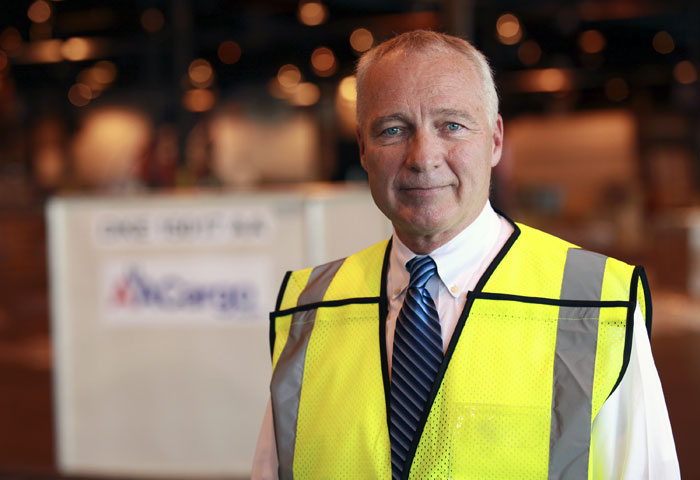Cargo Screening Goes Next Week

In
the early days of aviation, cruising a mile high up in the air in a DC3
or JU-52, you could always tell when it was Sunday because looking out
the window, the roads between the towns below were mostly empty, while
the parking lots around the churches were always full.
Come next Sunday, when 100% screening of
all USA air cargo goes into law, there may be a few more cars in the executive
parking areas at cargo centers, but by all measure things should be business
as usual.
While not underplaying the seriousness at
hand August 1st, what was once described in the media and elsewhere with
some fear and trepidation may just end up as another slow Sunday with
time for a walk in the park.
In the USA, the gentleman who has been evident
in all of this 100 percent August 1 conversation is Doug Brittin.
Doug has labored long and hard to get to
August 1, first as current manager of air cargo programs at the U.S. Transportation
Security Administration (TSA) and since May 2010, as that organization's
General Manager Cargo.
Mr. Brittin is likable, low key and thoroughly
professional, and his picture here lets you know that right away.
But beyond the obvious, Mr. Brittin has
done some kind of superior yeoman job. Doug was given the position after
Ed Kelly, the former TSA chief of air cargo, died suddenly of Legionairres’
Disease shortly after attending Air Cargo Americas in Miami last autumn.
As the countdown continues we spoke to Doug
Brittin, who shared some further thoughts as air cargo’s big day
approaches.
ACNFT: Is
the USA ready for 100% screening?
DB: Overall,
the industry is well prepared in the U.S. There should be no issues at
any non-wide body airport, as that cargo has been 100 percent screened
since October 1, 2008.
Carriers at larger airports that have only
a few wide body flights per day are already close to the mandate, if not
already fully there.
The carriers at the 18 major gateway airports
have all indicated that they are prepared to get over the "final
mile,” but caution that, depending on how much cargo comes in pre-screened,
there may be some instances where cargo misses its intended flight.
We have seen that most have advised their
forwarders or direct shippers to bring unscreened cargo earlier than previously,
to allow time for screening to occur (and have published new screening
fees).
We also have a 'latent capacity' in existence
as well, with over 75 Independent Cargo Screening Facilities (ICSF's),
most of which are at these 18 airports, who can screen on behalf of smaller
forwarders or shippers, in advance of delivering the cargo to the airlines.
They have indicated the ability to handle over 25-30 million pounds per
month.
ACNFT: Where
are the challenges?
DB: As
noted, we really only see any possible challenges occurring at the 18
major gateways.
The challenge for international inbound
is primarily awareness.
We would prefer not to have carriers having
to comply with TSA programs as well as origin country programs.
However, we cannot accept country programs
as commensurate until we are able to review them. We are working with
groups such as ATA, IATA, TIACA and AFA, as well as EC and other bi-lateral
efforts to help raise awareness and hopefully facilitate sharing of these
programs as quickly as possible.
ACNFT: What
surprised you during the past weeks and months, as the deadline has been
approaching?
DB: It
did not surprise us that we received a sudden interest in the CCSP, and
a high level of applications! We were prepared
for that and our teams are certifying many new entities quickly. As we
suspected, some companies waited too long (it takes an average applicant
60-90 days from start to finish, depending upon how prepared they are
when they start the process).
We were also pleased to see the communications
effort by the forwarders and airlines, as well as their additional investment
in equipment and training, to make up any gaps in capacity.
ACNFT: Where
will you be on August 1 (in church praying?)
DB: We
will all be actively monitoring the situation!
ACNFT: FT:
Is there anything you wish had gone differently in this run up to 100
percent?
DB: Despite
our outreach to over 100,000 companies in the past few years, most companies
chose to take a ‘wait and see’ attitude.
I am not sure we could have done anything
differently. We will continue to certify new locations, as we are fairly
certain that, post-August 1, many shippers will realize that “yes,
my shrink-wrapped skids and/or high value products are indeed being taken
apart and screened,” and are showing up at the other end not looking
exactly like they were when they left the dock.
As for inbound to the U.S., we will keep
the pressure on to try and get more country programs evaluated and hopefully
accepted, but if that does not happen, the carriers alone will have the
burden of screening 100 percent, at the piece level, in their airport
facilities overseas. That is not an ideal scenario for anyone.
Geoffrey/Flossie
|



